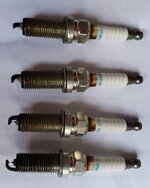Hi All,
I recently did the spark plugs in a Mazda 3 Skyactiv 2.0 with only 120,000 km. There was no CEL, it was preventative maintenance.
3 of the spark plus were fine. 1 was slightly oily.
The car has had regular changes with 0W20. The oil level practically doesn't change between OCIs (8000 km to 10000 km).
I am thinking about switching from 0W20 to 0W30. I'm thinking that once 0W30 gets sheared and diluted it will be 0W20.
However, fans of the Skyactiv engine are usually really adamant about 0W20 and most UOAs come back really clean.
Is there any issues with going up to 0W30 and could it help the oily spark plug situation?
I recently did the spark plugs in a Mazda 3 Skyactiv 2.0 with only 120,000 km. There was no CEL, it was preventative maintenance.
3 of the spark plus were fine. 1 was slightly oily.
The car has had regular changes with 0W20. The oil level practically doesn't change between OCIs (8000 km to 10000 km).
I am thinking about switching from 0W20 to 0W30. I'm thinking that once 0W30 gets sheared and diluted it will be 0W20.
However, fans of the Skyactiv engine are usually really adamant about 0W20 and most UOAs come back really clean.
Is there any issues with going up to 0W30 and could it help the oily spark plug situation?

